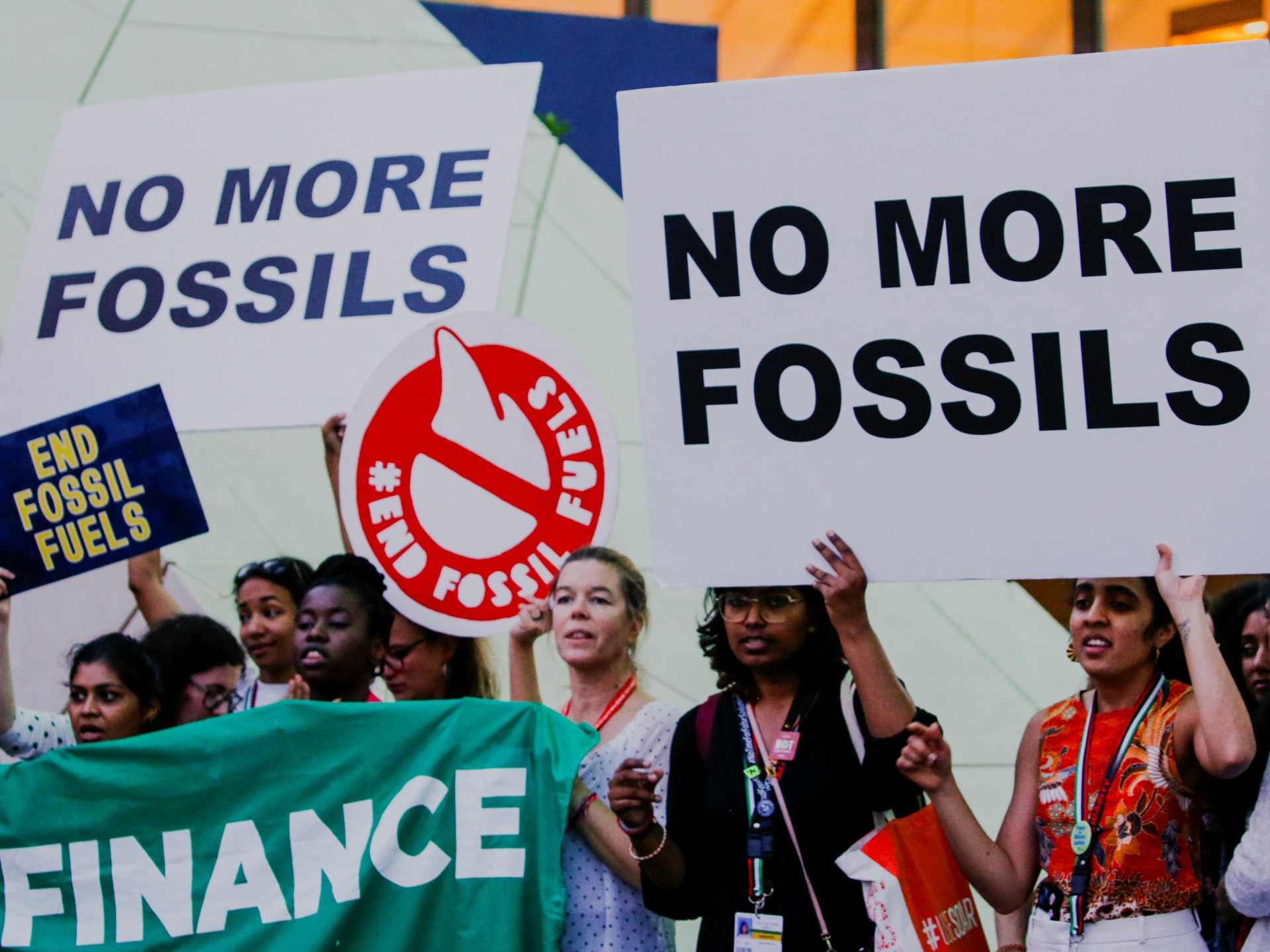It was supposed to be a matter of life or death. So the recent spectacle of COP28 delegates quibbling over the wording of a final agreement calling on countries to “transition away” from the fossil fuels causing climate chaos provoked widespread alarm.
Calling time on the status quo of using fossil fuels turned out to be the central battle within a fractious event that highlighted the might of an industry bent on survival for as long as possible. At long last, the main issue was being addressed. But was this progress?
As Doomsday predictions about the climate crisis mount and the UN chief, Antonio Guterres, warned that humanity has “opened the gates of hell” after record summer temperatures this year, the world appears stuck in an endless loop of missed targets and freak weather events.
The “final warning” came this year, when the UN’s Intergovernmental Panel on Climate Change reported that the world could surpass the point of catastrophic warming in the next decade unless it immediately stops guzzling fossil fuels.
So why all the dithering? What’s standing in the way of making real progress in the fight against climate change? And does using paper straws really make a difference?
Should we even look to COPs for progress?
No, according to climate scientist Michael Oppenheimer. Back in 1988, he was one of the first climatologists to sound the alarm about climate change when he presented his research into how humans were heating the planet through the burning of fossil fuels to the US Senate.
The Nobel Prize-winning scientist’s work paved the way for the 1992 United Nations Framework Convention on Climate Change. More than three decades later, he believes we are losing the race, having already been overtaken by extreme climate events that would not have happened had action been taken earlier.
“We’re playing catch-up now,” he said.
Oppenheimer said he doesn’t look to COPs for progress on reducing emissions – “That’s simply because the big emitting countries make commitments that they’re not going to meet.” But he added that he does believe the forum is valuable, helping to shine a light on issues, such as urgently needed finance for Global South countries at the sharp end of climate change.

Breakthroughs like the 2015 Paris Agreement have been rare. The scientist argued that people should adjust their expectations. Change happens at home, rather than around a negotiating table in Dubai, he added. “People who are active and interested in solving the problem should turn their attention to their domestic politics wherever they live.
“The politics in every country is different. The interest groups are different. Their power and influence are different, both on the environmental side and on the fossil fuel side.
“The change required involves the entire energy system of most countries. You have to do it in a way that satisfies or at least neutralises the interest groups who oppose change and that’s not easy.”
How do ‘interest groups’ oppose change?
George Monbiot, a British writer and environmental campaigner, has given the matter a lot of thought over nearly four decades. He has identified a phenomenon he calls “the pollution paradox”. In a nutshell, the companies that have the greatest incentive to invest in politics are also the “dirtiest”. “Because if they don’t invest in politics, they get regulated out of existence,” he said.
The influence of the biggest polluters goes beyond direct political contributions. As Monbiot pointed out, they also need a “social licence to operate”, mainly provided through greenwashing initiatives that make it seem like they are offering a solution to climate change. Their narratives are pushed to voters through a “concierge class” of think tanks – or “junk tanks”, as he referred to them – marketeers and journalists.
Monbiot said he reserves special scorn for carbon capture and storage (CCS), a nascent technology for stashing carbon dioxide underground. While the industry has hailed CCS as a “silver bullet” solution, many scientists and experts have cast doubt on its effectiveness. “It’s a dead duck,” Monbiot said, and others have described it as a distraction to extend the life of the fossil fuel industry.
Climate campaigners criticised COP28 for providing a space for greenwashing, with industry using the forum to push CCS. In a sense, the event offered a glimpse into how the fossil fuels industry works. According to research conducted by Kick Big Polluters Out (KBPO), a coalition of more than 450 international climate action groups, at least 2,456 fossil fuel lobbyists were granted access to the conference whose president was the chief executive of the United Arab Emirates’s state oil company.
As COP28 appeared to demonstrate, the real decisions regarding the energy status quo are made in clusters, in side meetings or in the corridors. “Democracy is the problem capital is always trying to solve,” said Monbiot. In his view, individual states do not have the power to stand up to capital’s might. “The structures are still standing, the institutions are still there, there are still parliaments, but the power has migrated elsewhere.”
Is change possible within the current system?
plSo, how can these interest groups be, as Oppenheimer puts it, neutralised?
Companies invested in hydrocarbons don’t want the energy revolution to move fast, he said. “They’re sitting on piles of uncashed resources. They want to burn up those resources first. We can’t let that get in the way, but it’s not going to be easy.”
He said he has placed his faith in the energy revolution, which he believes is gaining traction around the world, kickstarting a slow process of transition in countries eyeing market share. China may still derive 70 percent of its electricity from fossil fuels, but it is also the world’s top supplier of renewable energy technologies.
Eager to get a slice of the pie, the US – which has continued to approve oil and gas drilling projects – is ploughing hundreds of billions in state subsidies over the coming decade into companies investing in renewable energy and low-carbon technologies.
Although it has been hailed as a tax credits bonanza for controversial CCS, the Inflation Reduction Act will also accelerate the development of a domestic supply chain for clean vehicles, helping the country hit its target of ensuring 50 percent of car sales are electric by 2030.
“It’s an interesting experiment,” said Oppenheimer. “What it will do is create embedded interests, make the renewable energy interest much larger,” he says. Actors come from across the country, covering a lot of political ground – “they’re not all progressives, a lot of them don’t even care about the climate, but they’re interested in making money on renewable energy and that’s fine. That’s going to engage people.”
The energy revolution will involve continued “focus and effort” from governments, moving technologies from experimentation to commercial phases faster and not being “intimidated” by the “politically powerful” forces opposing change, he said.
Is there hope?
Only if people act, said Monbiot.
“We have to directly confront power,” he said. “There’s no point in messing around at the margins of this. We have to recognise that we are facing a world-eating system and it is that system that has to change.”
He added that he believes big environmental NGOs have been institutionalised, shying away from radical change and opting instead for an ethos of “incrementalism”, pushing what he calls “micro-consumerist b*****ks”. “Incrementalism is a symptom of cowardice,” he said.
“They know in their heart of hearts that they’re not going to change things by getting consumers to change plastic straws for paper ones. But they don’t have the guts to say it.”
While he was more optimistic about market-based solutions, Oppenheimer remained downbeat on the prospects of playing catch-up while enduring threatening climate conditions. “We missed an opportunity decades ago to avoid seeing large-scale impacts of climate change that are hurting people and countries,” he said.
“We in the Global North have a moral obligation to help those much poorer countries in the Global South, who have contributed almost nothing to their problem – not only to recover from climate-related disasters, but to do better in the future by building resilience and adapting,” he said.
“It’s going to be a bit of a mess for some decades.”
Check out our Latest News and Follow us at Facebook
Original Source

